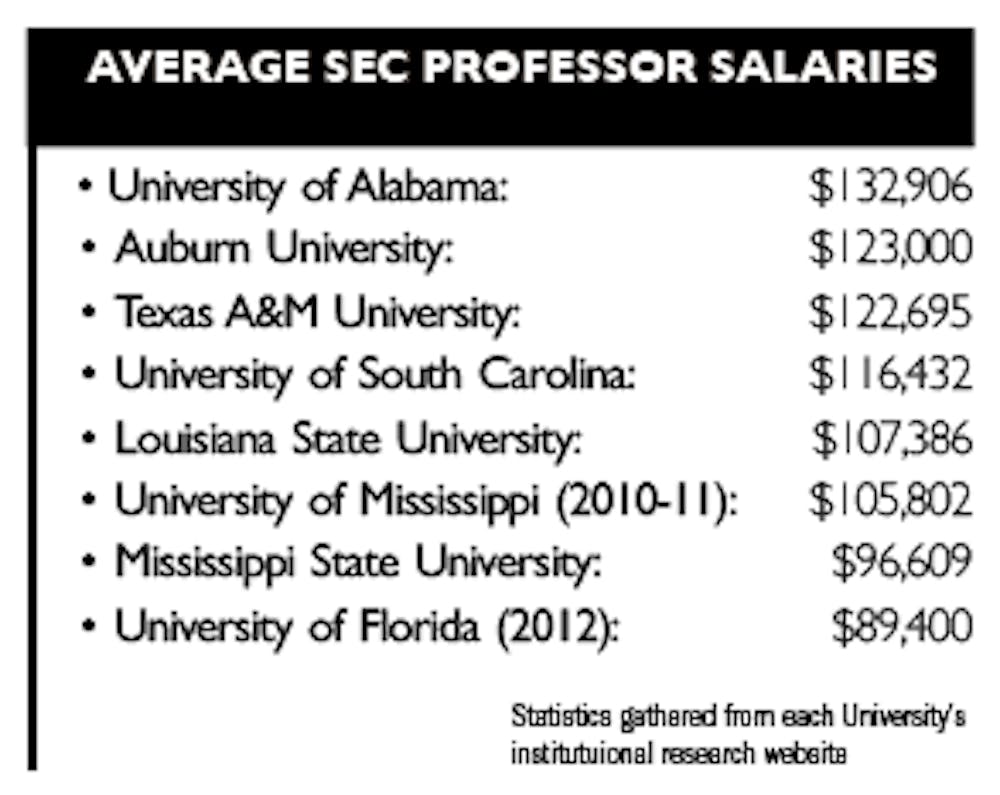How much someone earns is something everyone thinks about, but never discusses.
Unless you're an employee of a public university in Alabama, such as Auburn, then it's state mandated public knowledge.
"We post all payments made by the University to vendors or employees on a monthly basis," said Bryan Elmore, director of budget services.
By using the website AUapps.Auburn.edu/OpenAlabama/ one can look up the salary of Auburn University faculty members.
Elmore said, on average, professors earn $123,000; associate professors earn $84,000; assistant professors earn approximately $75,000; lecturers earn $50,000; instructors earn $28,000; post-doctoral scholars earn $43,000; visiting faculty earn $33,000; and research assistants or associates earn $47,000.
"Salaries are generally done in the ballpark of what other peers are making," Elmore said.
Drew Clark, director of institutional research and assessment said the figures used to set salaries were partially drawn from a group of 24 State Employment Relations Board flagship universities in a region spanning from Texas to Maryland.
"That's our peer group," Clark said. "It's a rich comparison group."
The University of Alabama, the University of Mississippi, Mississippi State, Louisiana State University, the University of South Carolina, Texas A&M and the University of Florida are also included among the schools that have agreed to be part of the information sharing group.
Auburn also used a group of 34 national land\0x2010grant universities to benchmark its payroll.
"Range between very best and least best is very narrow compared to other human endeavor," Clark said.
Clark said using these benchmarks Auburn pays its employees slightly less than average.
"In 2012-13 Auburn faculty members received salaries that were at about 91 percent of the average for all faculty members at the 24 leading public institutions in the Southeastern region," Clark said.
He said that the University's goal is to meet the averages, which can essentially be done in two ways. One of these options would be to hire new faculty and salary them to push Auburn's salary averages closer to the average. While this would work, Clark said it is not the most likely scenario.
"In any five-year period there are many more existing faculty than new hires," Clark said. "We wouldn't bring in a new faculty member just to raise averages."
Simply taking on more employees also is not necessarily reliable to get closer to the benchmarks because there are factors out of the University's control.
"We could add salaries and they could add more," Clark said. "We could cut salaries and they could cut even more."
The other option, which would increase the pay average of Auburn faculty, is pay raises for existing faculty. It also seems to be the course of action most in line with the strategy outlined on the University's official website to, "place a key emphasis on attracting, retaining, and developing a diverse faculty committed to increasing Auburn's competitiveness and enhancing our academic reputation."
Elmore and Clark said that pay raises are decided by merit.
"Feedback matters - syllabus, assignments and tests," Clark said.
Clark said by being a research institute, size and privatization as well as performance evaluations affect how much faculty are paid.
He also said that while there is disparity in pay it is not a particularly wide margin. Elmore described the performance evaluations as being four-tiered and ranging from low to great.
"You have a base salary, and it will increase based on what your supervisor writes as an increase," Elmore said.
Elmore said another factor that is considered when considering pay raises is the availability of funds.
"In recent years, department funds available has probably played a bigger role," Elmore said. "In the past, merit really was the biggest factor."
Clark said, in general, the education job market is one of the most purely merit-based job markets, so it is logical that positive results earn compensatory rewards.
"It's always, in essence, 'what have you done for me lately,'" Clark said.
Do you like this story? The Plainsman doesn't accept money from tuition or student fees, and we don't charge a subscription fee. But you can donate to support The Plainsman.





